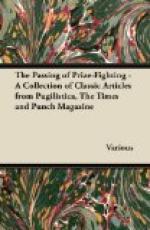* * * * *
[Illustration: Mistress (from upper window). “WHATEVER ARE YOU DOING OUT-OF-DOORS AT THIS TIME OF NIGHT, JANE?”
Romantic Maid. “ONLY THROWING A FEW CRUMBS TO THE OWLS, MA’AM.”]
* * * * *
WHAT DID MR. ASQUITH DO?
A famous story tells how a heckler once broke up a Liberal meeting by asking with raucous iteration, “What did Mr. GLADSTONE say in 1878?” or whatever year it was. Nobody knew, and neither did the inquirer himself, but uproar followed and his end was achieved. Now had the question run, “What did Mr. GLADSTONE do?” how different a result! For Mr. GLADSTONE, apart from any trifles of statesmanship or legislation, did two priceless things, as I will show.
Although, writes the Returned Traveller who in our last number was so unhappy about the deterioration that has come upon taxi-drivers, I left England only in October last, I find it a changed place; but no change, not even the iniquitous prices demanded by London’s restaurateurs, or the increased darkness, or the queer division of hors d’oeuvres into half-courses and whole-courses (providing an answer at last to the pathetic query, “What is a sardine?” “A whole course, of course")—no change is so striking as the fact that when a paper now refers to the PRIME MINISTER or the PREMIER, it means no longer HERBERT HENRY but DAVID. In a world of flux and mutability I had come to think of Mr. ASQUITH as a rock, a pyramid, a pole-star. But, alas! even he was subject to alteration.
Thinking earnestly upon his career I have realised bow sad it is that he has bequeathed us no ASQUITH legend. Always reserved and intent, he discouraged Press gossip to such a degree as actually to have turned the key on the Tenth Muse. Everybody else might lunch at the hospitable board in Downing Street, but interviewers had no chance. In vain did the Quexes of this frivolous city hope for even a crumb—there was nothing for them. Mr. ASQUITH came into office, held it, and left it without a single concession to Demos’s love of personalia. He did not even wear comic collars or white hats or a single eyeglass or any other grotesquely significant thing; and how much poorer are we in consequence and how much poorer will posterity be!
Contrast the case of Mr. GLADSTONE, from whom anyone could draw a postcard and most people a chip of some recently-felled tree, and who is in my mind wonderful and supreme by reason of two inventions which, though no one would ever guess them to be the result of a Prime Minister’s cogitations, deserve the widest fame. Of these one was the product of his unaided genius; the other the result of the collaboration with his wife.
Let us begin with the individual triumph.
Everyone who has ever stayed under anyone else’s roof, from a dine-and-sleep at Windsor Castle to a week in lovely Lucerne, has been confronted, when packing-up time arrived, with the problem of the sponge. No matter how muscular the fingers that wring this article, no matter how thick and costly the rubbered receptacle that holds it, there is always the chance of dampness communicating itself to other things in the bag. Isn’t there?




